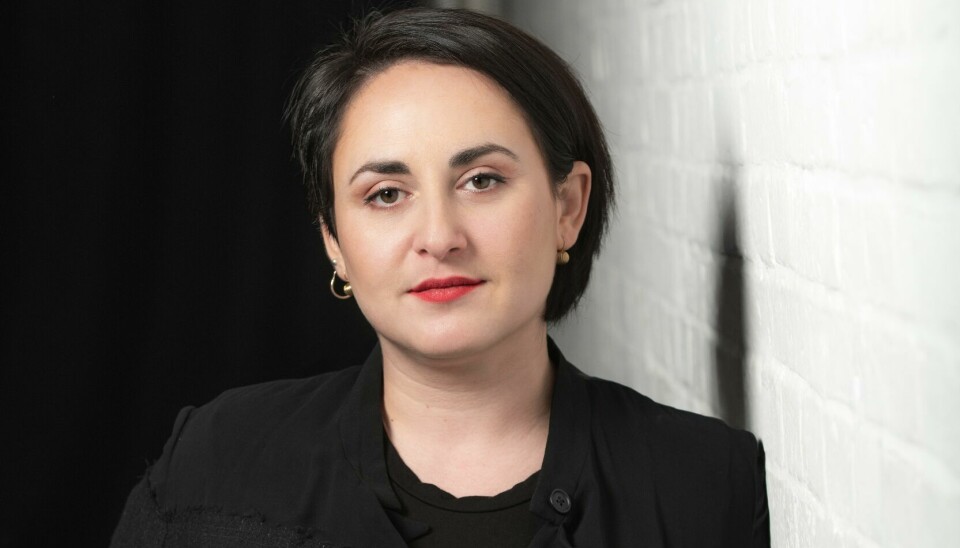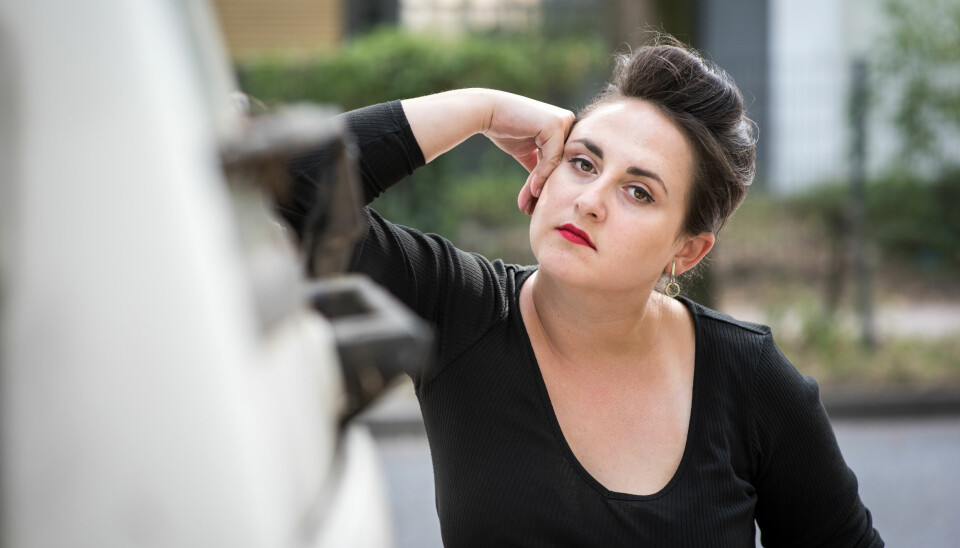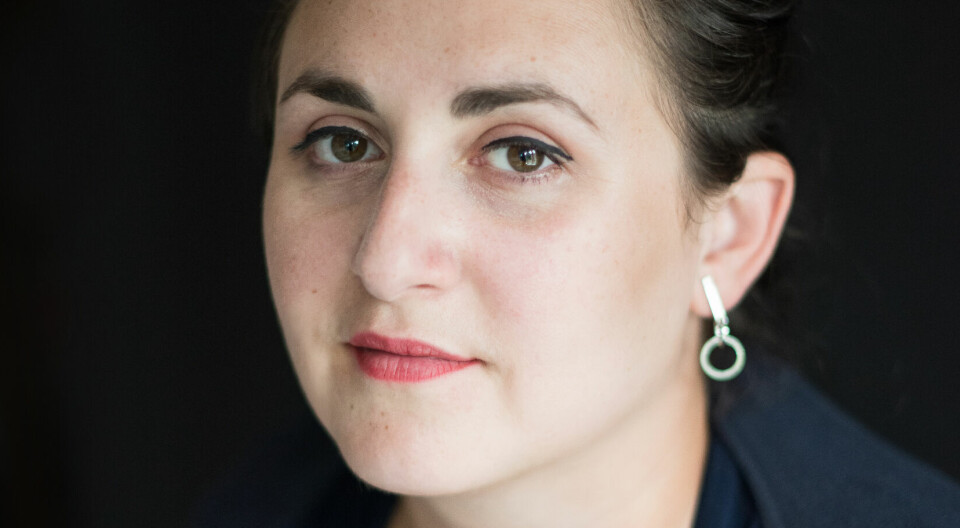NAVRAAG NINO HARATISCHWILI
'When cruel events are forced upon you, you approach life differently'

Author Nino Haratischwili returns in 'Das Mangelende Licht' to a turbulent Georgia during the '90, a period she can't let go. She wrote the story she always wanted to tell.
Nino Haratischwili is the writer of 'The eighth life (for Brilka)', an epic centered around a Georgian family over the course of a hundred years. In her third book, focusing on an era she lived by herself, Haratischwilli returns to Georgia.
'Das Mangelende Licht' tells a story of four friends growing up in Georgia during the turbulent nineties. As the Georgians recently gained independence from the Soviet Union, the country slipped into a state of anarchy.
As she was six years old when Georgia started to gain independence from the USSR, Haratischwili does not remember as much from that period. She recalls riots taking place and the fall of the Soviet Union two years merely later in 1991. Haratischwilli does look back on her childhood memories, however, she can't state that these shaped her life. Actually, everything afterwards had an immense impact on her life, as what she's trying to describe in her novel.
Your most recent novel is situated during an era you grew up in. Does the story contain autobiographical elements?
Nino Haratischwili: 'The narrative is embedded in a historical background that, unfortunately, actually took place in recent times. However, the story itself is fictional; the characters are invented. Yet, big parts described in the book are aspects I recall very well. A lot of other people who went through it, remember as well.'
'I'm quite lucky that I was younger than the characters in the book: I was unaware of my surroundings, but the violence of that period had an impact on everyone who lived in Georgia at the time.'
Your first novel was also about Georgia, your second was
about Russian invasion in Chechnya: how preoccupied are you with Russia and its
imperialism?
'It is a personal matter: my course of life is
shaped by all these problems. The riots and political instability of Georgia
had an immense impact. Until these days the problems persist.'
It had to be emotional, otherwise I'd better write a history book
'Everything that is taking place in Ukraine, but also other events of the past twenty years, can be traced back to the same issue. These problems have influenced my life, just as the lives of many other people who are living in those regions.'
'It is not just a case I hear on the news about; it is a personal concern which I bear in mind continuously.'
Fear and betrayal
Among other things, you write about fear, death, death, pain, loss and betrayal. These heavy topics are paired with equally heavy emotions. Are they unmistakably part of the history of these countries?
'I didn't invent those painful feelings: they appeared during my research and the conversations I had for my first book. I didn't want to take it easy: to do history justice, I had to immerse myself in those emotions.'
'Based on that, I tried to find an appropriate writing style. It had to be emotional, otherwise I'd better write a history book. I have tried to 'color' my characters, so as to reflect the world in them.'

Was it difficult to delve into those emotions?
'Occasionally yes, but after years of experience I have found an appropriate way to deal with it. You have to draw a clear line between the writing process and everyday life. As you write you have to open up to the emotions and empathize with the characters. However, every time I stopped writing, I closed the door and let those emotions go. That is necessary to continue your own life.'
For your last book, you mainly based yourself on your own memories. How did that writing process go?
'It was a very personal experience. I've wanted to write this story for a long time to place Georgia during the 90s in the limelight. As it is such a complicated history, I searched for the right approach for a long time. I wanted to find the right tone and structure.'
I had fallen in love with Brussels
'Once I had found an approach, the writing process wasn't so difficult anymore. I even felt a kind of relief when the story was completed. I felt it was important to analyze my past in an appropriate way without getting too emotional or getting lost in it. I needed some distance to write about it; after all these years I finally reached it.'
Bruxelles, ma belle
There was also a physical distance. Did that help you?
'Yes, I moved to Berlin when I was twenty and still reside there today. Being in another place gives you a different perspective on problems. When you find yourself in the middle of a situation, your field of view is narrow. Once you remove yourself from that, you can approach the issue from multiple angles. However, you pay a price for it of course: you're not a part of the scene anymore.'
You also don't write in your mother tongue: is that a conscious decision?'It was a practical matter since I had studied in German, so I was fluent once I moved to Berlin. I wanted to stage a play there and wrote it immediately in German so I wouldn't have to translate it afterwards. I liked this approach. Because it was not my mother tongue, I was more playful with the language. Later on I wrote more plays and got into the language more and more.'
The characters are forced to look at pictures of which they're a part, the history they don't want to recall anymore
'Another reason to write in German is because it is not my mother tongue. It creates some distance. The longer I have been writing now, the more difficult it has become to go back to Georgian. Maybe it is also because I have stayed in Germany. If I would have gone back to Georgia, I probably would have started writing in Georgian again.'
You write very long novels. The first one was over a thousand pages, the most recent one is almost eight hundred. What is the writing process like?
'This book took me three years, but with big breaks in between. My second daughter was born. It was difficult, because when I start something I want to continue and finish it. Was not easy to be forced to have a break. But it worked out. A big part of the book was also written in Brussels, I had gotten a residency in Passa Porta.'
Is that why you let the characters meet in Brussels?
'Yes, because I had fallen in love with the city. I stayed here in spring: everyone was sitting outside, it was sunny,... It was relaxing and nice. I walked a lot, discovered a lot. So I thought: why not Brussels?'
We need to hear more female voices
'I was looking for a reason to let the characters meet in the present time. Why would they meet again, and why do they remember all the things they'd wanted to forget? Then I came up with the idea of an exhibition. That way the characters are forced to look at pictures of which they're a part, the history they don't want to recall anymore. They are at the exhibition so they cannot flee or go away.'
Why was the present time so important for the story?
'For the same reason that I myself needed distance: for these kinds of events you need distance. When you experience these events, it is impossible to immediately take a step back and talk about it.'
'You always need some time to become aware of what happened and what it means and why people acted the way they acted and so on. It would be more natural to talk from the present position, and I needed a main reason why: the exhibition in the Bozar in Brussels.'
Guilt & fate
In your first novel there's a touch of magical realism: every time a delicious chocolate drink is made, disaster is sure to happen. What was the idea behind that?
'The chocolate drink symbolizes some kind of fate or destiny. While interviewing people and reading about the regime, I discovered that people often thought about these ideas. The dictatorship in the Soviet-Union forced people to live a certain way, and so it became easier for people to deal with this dictated life by believing that bigger instance – God, Stalin or the party – shapes your life.'

'It's a means of survival: if you try to find your own happiness and private way of surviving in such circumstances, you can go mad, since everything is determined from outside. When cruel events are forced upon you, you approach life differently than people who lived freely. The chocolate was a red line through the book, symbolising this issue of fate.'
Most of the characters suffering under their fate are women. Was it a conscious choice to focus on women?
'Yes, I made that choice consciously. Of course it feels more natural since I'm a woman myself, but I also think we need to hear more female voices. Literature is saturated with male characters, voices and narratives.'
'Specifically for my last novel it was critical to tell the story from a female perspective, since the backdrop of the story is a dark and perverted version of a patriarchal society. Women fell outside of the structure, but were affected too.'
Another element which emerges throughout your novel is the guilt people feel at home for their immoral acts or past, and that they even try to conceal their actions. As if they have a different personality.
'Yes, it's a prominent phenomenon. I haven't experienced this personally, but I imagine certain people really have shut certain things out once they come home in the evening.'
'The most interesting thing about it is that all family members and friends know what those people are doing during the day. Of course they know, but everyone is lying, pretending that they don't know, so it has an impact on everyone involved.'
'One fifth of Georgia is occupied by Russia. On the other hand we receive refugees from the same country'
'It must do something with those people. I cannot imagine that you ignore such things and that everything is fine. There will still be some kind of consciousness or a bit of ethics knocking on your door. But maybe after a lot of years you learn to ignore that feeling more and more.'
Tolstoj from Tbilisi
How is your bond with Georgia right now?
'I try to go there as often as I can. I only recently came back from Tbilisi where I had a theater production. Most of my time is spent in berlin,but i try to be in Georgia as often as I can. When I'm in Germany I always stay in touch with friends from Georgia: I really live in between two worlds.'
Nowadays a lot of Russians have fled to Georgia. How does that feel, when history is still so present in Georgia?
'It is a very strange situation. On the one hand a fifth of the country is occupied by Russia. On the other hand we receive refugees from the same country. That's really overwhelming, and not easy to deal with. Not every Russian is a fan of Putin, but not every tourist is part of the opposition either.'
'Unfortunately, history is still alive and it keeps repeating itself. It didn't ever stop, it has only become more obvious to the West. The war in Ukraine brought , now it became obvious again. Ukraine: all what's happening has everything closer, but it's nothing new. Long ago it happened under a different regime, but it has been happening during the past twenty years as well.'
To end: you are often compared with the Russian writer Leo Tolstoj, since you also write long novels in which you talk about big events through the lifes of normal people. Do you think that's an honour?
(Smiles) 'Somehow it is an honour, but I always have to laugh about these comparisons. People always want to categorise things and compare writers to others, but of course I don't think about it that way. I don't start writing a book with the idea that I want to write like Tolstoj. That would be ridiculous. You cannot copy someone, you can only do it your own way. I'm happy that people see parallels, but I don't think about it myself.'









